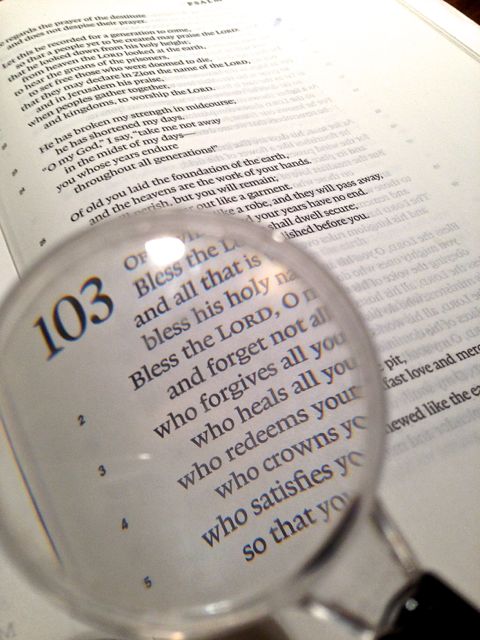 Sherlock Holmes is famous for his keen observation skills. He once admonished Watson, who was marveling at his abilities, “You see, but you do not observe. The distinction is clear.”
Sherlock Holmes is famous for his keen observation skills. He once admonished Watson, who was marveling at his abilities, “You see, but you do not observe. The distinction is clear.”
Do you have a hard time concentrating when you read the Bible?
Do you find yourself not even wanting to read the Bible?
Do you read it, but feel like it’s not changing the way you think and live?
You might need to quit just seeing, and start really observing.
Pull out a pen, a handful of colored pencils, and a notebook. Print out a passage, if you don’t like marking in your Bible. Then start reading the passage over and over.
Each time you read, watch for something different.
- Are certain words repeated several times?
Mark each of those words in a special way — circle them, underline, use your colored pencils to highlight them. Even little words like “in” can be significant when we see them concentrated in a short passage of Scripture.
Do you gain any new insights as you reread the passage, paying special attention to the words you have circled?
Would it help to record in a notebook all the phrases that contain these repeated words, and then look over what you have found? You will often pick up on the theme of a passage by simply noticing the repeated words.
- What does the passage say about God?
Highlight any nouns and pronouns (He, Him, etc.) that refer to Him. (I always use yellow.)
God is revealing Himself through His Word. Slowing down to really notice what He tells us about Himself will help us grow in our knowledge, love, fear, and worship of Him.
- Are any commands given?
These won’t look like the kind of commands a drill sergeant would bark. They’ll simply be statements like, “Do all things without grumbling or disputing,” and “Only let your manner of life be worthy of the gospel of Christ”. They’re telling us to do something.
Write each command you find in a notebook so that you can look over all the commands at once. What is God telling you to do in this passage?
- Many times, commands are followed by the reasons for obeying them.
Look for words like “because”, “for”, and “lest”. Underline those words. Then go back and reread what comes before and after those words. You’ll discover the “whys” of the passage.
Look for comparisons that are being made in the passage.
The Bible is full of word pictures. Marking the words “like” and “as” will help alert you to pictures of sluggards who turn on their beds like doors on their hinges, and quarrelsome men who kindle strife like hot embers that kindle a fire.
Besides helping us remember an idea better (who, after reading Proverbs 26:11, can forget the fool who repeats his folly?), these pictures are also effective teaching tools with our children.
- Look for words like but and however to help you see contrasts that are being made.
These contrasts are packed with meaning for us. They often jolt us into looking at ourselves more honestly.
We might feel pretty good about our spiritual state when we read, “Whoever loves his brother abides in the light,” until a big circled “but” alerts us to the contrast, “But whoever hates his brother is in the darkness and walks in the darkness…”
- Look for words like therefore, and then find out what that word is there for.
“Therefore” and “so” point to conclusions that are being made. Go back and look at the verses that preceded the “therefore”. That’s where you’ll find the reasoning for what we are told next.
When Paul says, “I appeal to you therefore, brothers, by the mercies of God, to present your bodies as a living sacrifice, holy and acceptable to God, which is your spiritual worship…” we need to look back at the end of Romans 11 and read what he tells us about God.
“Oh, the depth of the riches and wisdom and knowledge of God! How unsearchable are his judgments and how inscrutable his ways! … From him and through him and to him are all things…” He is worthy of our worship!
God’s Word is alive and powerful. Slowing down to look carefully at God’s Word and then meditating on what we find will change us.
This kind of Bible study is totally doable — even for busy mothers with a house full of children! This is the kind of study that carried me through those challenging years of insanely busy motherhood. In just a few minutes a day, reading the same passage for a month, you can study in a way that you’ve probably thought was impossible while you’re trying to even get the dishes done (or the table cleared?) before the next meal (or week)! But it is possible, and it’s life-changing!
You can study like this on your own, but if you want some encouragement, some accountability, and some good fellowship, join us starting this Saturday, November 1, when we launch our next “Busy Mamas” Bible study — this month on Psalm 103. For 30 days we’re going to really dig into this amazing psalm of worship and gratitude to our awesome, loving, powerful God. We’ll learn more about Him, more about ourselves, and more about studying the Bible, in just 5-15 minutes a day!
Interested? Stay tuned for more details this Thursday!

1 Trackback